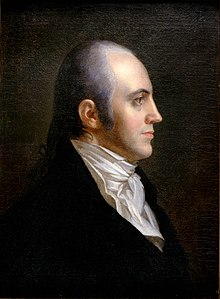
Aaron Burr Jr. was an American politician, businessman, lawyer, and Founding Father who served as the third vice president of the United States from 1801 to 1805 during Thomas Jefferson's first presidential term. He founded the Manhattan Company on September 1, 1799. Burr is remembered for his famous personal and political conflict with Alexander Hamilton, which culminated in the Burr–Hamilton duel in Weehawken, New Jersey, on July 11, 1804. Burr mortally wounded Hamilton, who died from his wounds the following day.
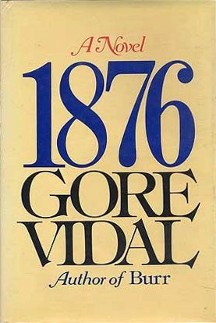
1876 is the third historical novel in Gore Vidal's Narratives of Empire series. It was published in 1976 and details the events of a year described by Vidal as "probably the low point in our republic's history".
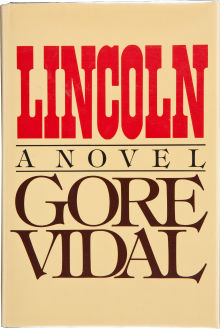
Lincoln: A Novel is a 1984 historical novel, part of the Narratives of Empire series by Gore Vidal. The novel describes the presidency of Abraham Lincoln and extends from the start of the American Civil War until his assassination. Rather than focus on the Civil War itself, the novel is centred on Lincoln's political and personal struggles. Though Lincoln is the focus, the book is never narrated from his point of view ; Vidal instead writes from the perspective of key historical figures. He draws from contemporary diaries, memoirs, letters, newspaper accounts, the biographical writings of John Hay and John Nicolay, and the work of modern historians.

Burr Gore Steers is an American actor, screenwriter, and director. His films include Igby Goes Down (2002) and 17 Again (2009). He is a nephew of writer Gore Vidal.

The Burr conspiracy was a plot alleged to have been planned by Aaron Burr in the years during and after his term as Vice President of the United States under U.S. President Thomas Jefferson. According to the accusations against Burr, he attempted to use his international connections and support from a cabal of American planters, politicians, and army officers to establish an independent country in the Southwestern United States, parts of Mexico, and Florida. Burr's version was that he intended to farm 40,000 acres (160 km2) in the Texas Territory which had been leased to him by the Spanish Crown.

The Burr–Hamilton duel took place in Weehawken, New Jersey, between Aaron Burr, the third U.S. vice president at the time, and Alexander Hamilton, the first and former Secretary of the Treasury, at dawn on July 11, 1804. The duel was the culmination of a bitter rivalry that had developed over years between both men, who were high-profile politicians in the newly-established United States, founded following the victorious American Revolution and its associated Revolutionary War.

Peter Silvester was an American politician who was a member of the United States House of Representatives from New York, and a prominent Federalist attorney in Kinderhook. He was a mentor to Martin Van Buren, the 8th President of the United States and was the grandfather of New York Representative Peter Henry Silvester.
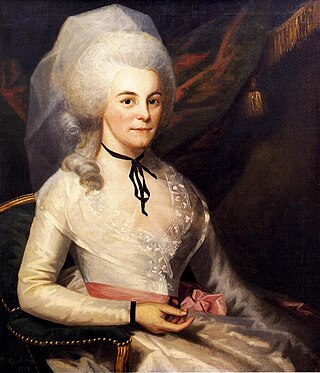
Elizabeth Hamilton was an American socialite and philanthropist. She was the wife of American Founding Father Alexander Hamilton and was a passionate champion and defender of Hamilton's work and efforts in the American Revolution and the founding of the United States.
The Narratives of Empire series is a heptalogy of historical novels by American author Gore Vidal, published between 1967 and 2000, which chronicle the dawn-to-decadence history of the "American Empire"; the narratives interweave the personal stories of two families with the personages and events of U.S. history. Despite the publisher's preference for the politically neutral series-title "American Chronicles", Vidal preferred the series title "Narratives of Empire". The seven novels can be read in either historical or publication order without losing narrative intelligibility.

The 1804 New York gubernatorial election was held in April 1804 to elect the Governor of New York. Incumbent Governor George Clinton did not run for re-election, having been nominated for Vice President of the United States in February. In a campaign that blurred partisan divisions, Morgan Lewis defeated Aaron Burr by a landslide margin.

James Alexander Hamilton was an American soldier, acting Secretary of State, and the third son of Alexander Hamilton, one of the Founding Fathers of the United States. He entered politics as a Democrat and supporter of Andrew Jackson.
Colonel Alexander Hamilton Jr. was the third child and the second son of Elizabeth Schuyler and Alexander Hamilton, one of the Founding Fathers of the United States.

William Peter Van Ness was a United States district judge of the United States District Court for the District of New York and the United States District Court for the Southern District of New York, also notable for serving as Aaron Burr's second in Burr's duel with Alexander Hamilton.
Events from the year 1801 in the United States.

Hamilton: An American Musical is a sung-and-rapped-through biographical musical with music, lyrics, and a book by Lin-Manuel Miranda. Based on the 2004 biography Alexander Hamilton by Ron Chernow, the musical covers the life of American Founding Father Alexander Hamilton and his involvement in the American Revolution and the political history of the early United States. Composed over a seven-year period from 2008 to 2015, the music draws heavily from hip hop, as well as R&B, pop, soul, and traditional-style show tunes. It casts non-white actors as the Founding Fathers of the United States and other historical figures. Miranda described Hamilton as about "America then, as told by America now."
"Your Obedient Servant" is the twentieth song from Act 2 of the musical Hamilton, based on the life of Alexander Hamilton, which premiered on Broadway in 2015. Lin-Manuel Miranda wrote both the music and lyrics to the song. The song is sung by the characters of Hamilton and Aaron Burr, originally performed by Miranda and Leslie Odom Jr., respectively.
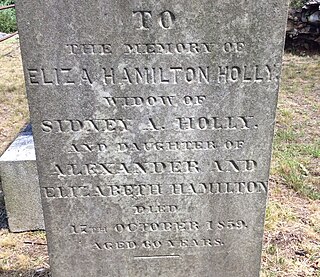
Eliza Hamilton Holly was the seventh child and second daughter of Alexander Hamilton, one of the Founding Fathers of the United States, and his wife, Elizabeth Schuyler Hamilton.
"The Reynolds Pamphlet" is the fourteenth song from Act 2 of the musical Hamilton, based on the life of Alexander Hamilton, which premiered on Broadway in 2015. Lin-Manuel Miranda wrote both the music and lyrics to the song.

Hamilton is a 2020 American biographical musical drama film consisting of a live stage recording of the 2015 Broadway musical of the same name, which was inspired by the 2004 biography Alexander Hamilton by Ron Chernow. Co-produced by Walt Disney Pictures, 5000 Broadway Productions, RadicalMedia, Nevis Productions, and Old 320 Sycamore Pictures, it was directed by Thomas Kail, who also produced the film with Jeffrey Seller and Lin-Manuel Miranda. Miranda, who wrote the music, lyrics, and book for the musical, also stars as Treasury Secretary and Founding Father Alexander Hamilton, along with the musical's original principal Broadway cast, including Leslie Odom Jr., Phillipa Soo, Christopher Jackson, Renée Elise Goldsberry, Daveed Diggs, Anthony Ramos, Jasmine Cephas Jones, Okieriete Onaodowan, and Jonathan Groff.
Alexander Hamilton has appeared as a significant figure in popular works of historical fiction, including many that focused on other American political figures of his time. In comparison to other Founding Fathers, Hamilton attracted relatively little attention in American popular culture in the 20th century.

